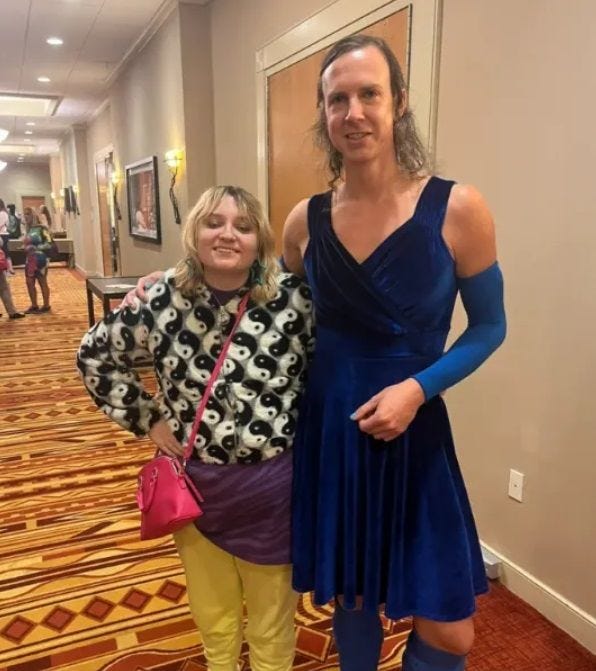The perils of success
Gender-critical groups have become remarkably influential, remarkably fast. But they’re still small and young, and need to prepare for greater scrutiny
On 4th and 5th November Genspect, a coalition of clinicians and therapists that promotes evidence-based approaches to treating gender distress, held its second conference in Denver. I would have loved to attend – the first-ever Genspect conference, in Killarney this year, was brilliant – but the travel and my other commitments meant it was too much. So instead I followed events from home, envious of all the attendees, who included many friends and people I have long admired and would have loved to meet.
If you are not a subscriber to my weekly newsletter, you might like to sign up for free updates. I hope that in the future you might consider subscribing.
The programme was brilliant; the event a triumph; the challenge to the harmful, evidence-free “gender-affirmative” approach being touted at the conference of USPATH on at the same time in the same city, spot-on. And yet pretty much all the talk since has concerned a single tweet from the Genspect account about Phil Illy, an attendee who is a self-described autogynephile (a man with a paraphilia in which he is aroused by the idea of being a woman). Illy was photographed in a blue velvet dress with Laura Becker, a detransitioner; he also used the conference as an opportunity to promote his book.
Down the line I may write about the minutiae of the row, but for now I won’t. When the volume of tweets on a subject reaches a certain point, anything further is counterproductive; it’s simply inevitable that people at the raw end experience it as a pile-on. I’ve decided to let the dust settle before I try to pick out the signal from the noise. In the meantime Lisa Selin Davis, who was at the conferences in both Killarney and Denver and who is one of the best analysts of the gender madness in America, has written about it all for her own Substack, Broadview.
Instead what I’m going to do is talk a bit about what Gender Critical Inc needs to do to make blow-ups less frequent, less painful and more productive for all concerned.
Until quite recently missteps on social media by gender-critical individuals weren’t important from the PR point of view because they rarely got picked up in the mainstream media. An individual might suffer legal consequences – a run of people, including Harry Miller and Kate Scottow, suffered legal and employment consequences because of things they said on Twitter. But only JK Rowling was big enough that what she said on social media became a story in the mainstream media. The rest of us could get into miserable Twitter spats without needing to think about it in terms of “crisis comms”, as PR people call the response to a sudden blow-up.
But as GC Inc has grown and gained greater influence, that is sure to change. We get a lot more media coverage now, and there is plenty of crossover between social and mainstream media. But almost none of the GC groups are big enough or old enough to have established brands distinct from their founders and spokespeople – let alone a crisis comms strategy.
On top of this, the way the mainstream media cover GC Inc is unlike anything I’ve ever seen before, in both content and tone.
First, the sheer volume is quite extraordinary. Almost all of the couple of dozen gender-critical organisations are grassroots with little or no money. Most consist of just one or two people. The ability of groups like Fair Play For Women, LGB Alliance, Transgender Trend and of course Sex Matters, where I work part-time, to get quoted in print media is nothing short of astonishing. We’re a fixture in the Telegraph, Times and Mail, and sometimes mentioned even in the Guardian.
Broadcast media are less friendly. It’s easy to get on Talk Radio/TV or GB News; almost impossible to get on anywhere else. I’ve been interviewed by a few small regional radio stations in Ireland, but I am so solidly shunned by our state broadcaster, RTÉ, that when Graham Linehan mentioned my name in a reply in a pre-record this week, it was cut out of the broadcast despite it being the reply to a question that remained in the broadcast edit.
I must say it was a bit sneaky of @thisweekrte to cut out my answer about @HJoyceGender. Perhaps they could make up for it by interviewing *her* at long last? What do you say @MrJustinMac? https://t.co/7Mg5pbbJkl
— Graham Linehan (@Glinner) November 12, 2023
But the really weird thing isn’t this wild contrast between high profile and zero profile, depending on the outlet: it’s the way we’re quoted and referred to. When we’re not being dismissed as pretty much Nazis, journalists repeat us slavishly, as if we’re oracles. I’ve taken to sending absurdly long quotes to journalists who ask for comment – far longer than I would ever have used myself when I was on the other end of such requests – and watching with astonishment as they print the entire thing. AsI’m writing this, there’s an example in the Telegraph. I am quoted at extraordinary length:
Helen Joyce, director of advocacy at Sex Matters, told The Telegraph:
“Endometriosis is a disorder that involves cells from the womb lining finding their way to other parts of a woman’s anatomy, and it can cause infertility.
“So, of course, it’s a women’s reproductive issue; it’s absurd and offensive to the many female sufferers of this debilitating condition to say otherwise. Yes, women who identify as men or non-binary can have the disease – how you identify obviously doesn’t change your biology. And, yes, there are a handful of cases in the literature where biological men suffer from something similar, but these are ultra-rare exceptions.”
Ms Joyce said that Ms Hughes’ remarks suggesting endometriosis should not be framed as a gynaecological issue were “offensive”.
“Endometriosis is poorly understood and researched precisely because it only affects women and our reproductive systems. This is part of the systemic lack of research and funding for “women’s issues”.
“The answer is for the medical profession to step up and do more for women – not to rebrand women’s disease by pretending they also affect men. People can’t in reality change sex, and men won’t start suffering from endometriosis even if we pretend people can change sex (and no man should want this disease; it’s horrific).”
That’s more than 200 words of an article of 550 words. Quite extraordinary.
Meanwhile references elsewhere skirt pretty close to the border of defamation. Take this by Robin Moira White in the Independent, which I think probably went via the paper’s lawyers to check it landed on the right side of the line. As for Pink News, or Varsity or LA Review of Books: I don’t even bother to answer if they ask me for comment; I just leave them to their deranged imaginings.
None of this is normal. It’s not normal to treat sources as infallible saints; it’s also not normal to imply that someone with entirely mainstream views is not far off being a Nazi, let alone to do so without contacting them to offer right of reply (I wrote to the Independent’s editor about White’s article, and complained to the reader’s editor at the paper; needless to say I got no response). Actually, I’m understating the weirdness: it’s not normal to blame entirely unconnected people for a child’s tragic death. It’s beyond nasty; it’s bizarre.
Obviously I like being able to send a growing number of journalists story ideas, comments and tips and seeing them bear fruit – but someday someone is going to do their job, and start asking tough questions about Gender Critical Inc. I want to be ready to be proud of the answers, and I think I, and the organisation I work for, can be.
But gender-critical groups largely lack the sorts of guardrails and processes that protect people working in charities and campaign groups that are better funded and grew more slowly. There’s so much work, and it’s all so urgent, that the women (and a few men) in these groups are moving fast and occasionally breaking things. The groups are almost all still very close to being individuals – and so when one comes under fire the temptation is to respond in the way an individual might: with hurt and anger, rather than the distance and coolness that comes from separating people from the brand.
I’ve had to cope personally with what I’ll loosely call “bad press” several times. Here’s what I’ve learned from the experience.
The first step is to acknowledge that it feels like shit. It’s pretty much impossible not to interpret lots of people simultaneously tweeting to or about you as a co-ordinated attack or a mob. You can’t help picking out the most ill-judged, hyperbolic and unfair criticisms, think of them as representative and respond emotionally. It’s almost impossible not to feel defensive. You write an entire book, or organise an entire conference, or whatever, and people pick out a few words that perhaps could have been phrased better? It feels so damn unfair.
At the same time, however, you feel angry with yourself, and ashamed. If you had just thought a bit harder before speaking or tweeting; if you had only chosen your words with a bit more care. And it’s much worse when the criticism comes from people you normally regard as allies. It feels like lack of solidarity, like jealousy, like betrayal.
The single most important tip is not to do anything in the heat of the moment. It’s imperative to get some support, even if it’s just a family member or friend. You need someone to give you a detached take on how to respond – and indeed, whether you should at all. That said, if you do need to respond, don’t dawdle. It looks awful not to respond until days later. A few hours is probably okay; or at most the following day.
When it comes to writing a statement, it should be short, factual and cool in tone. The last thing you want is to give your critics further ammunition. State the facts; acknowledge what you got wrong; explain briefly what you’re doing to fix it – and stop. Don’t get drawn into back-and-forths. Remember that by now other people are very cross, and even if you’re trying to be your best self lots of them won’t be doing anything of the sort (and that’s ignoring the fact that some of them really are nasty trolls).
If despite your best efforts you realise after giving your considered response that you omitted something essential or got something wrong, edit your original statement rather than putting out a new one, adding a “post-publication note” at the bottom explaining what changed and when. This minimises the chance that your critics will take the change as a sign of weakness and push you further. It also helps avoid the charge that you are untransparent.
If you can avoid an outright apology, do. I hate saying this, because the ability to apologise is an important skill and very disarming in real life. But online it’s too likely to have the same effect as blood in the water, inspiring your most devoted critics to make further attacks.
Whether you’re responding on your own behalf or for an institution, keep reminding yourself it’s really not personal, even though it seems so. I’ve found it helpful to remember that you can only be criticised if you’re being heard. And the more successful you are, and the more widely respected, the less likely your usual allies will be to hold back when they criticise you. It’s a compliment, really: they think you can take it.
Once the immediate response is over, you need a washup to consider the lessons learned. These may be to do with process, or the row may have blown up over a genuine organisational weakness. Even if you can say, hand on heart, that this time the criticisms are really nonsense, the fact that you’ve just had a pile-on may still reveal a failure of process or tone.
It’s imperative to keep blame and recriminations out of the washup, even if there really is someone at fault. One of my old friends in journalism introduced a libel into an article shortly before it went to press. They really, really should have known better: the subject of the article was a famously litigious businessperson, and my friend was senior and experienced. In this case, they tweaked a few words to tighten up a sentence, without remembering that this article absolutely must have had every word scrutinised from all angles by a libel lawyer. Those tweaks changed the entire tone of the article, and the businessperson sued for libel. Although a settlement was reached, and it wasn’t catastrophic, the whole thing occupied a lot of senior journalists’ and lawyers’ time.
My friend felt truly terrible, but suffered no career consequences. Good people need to know that a single slipup won’t mean the end of their career, otherwise the organisational culture becomes defensive and backstabbing.
This isn’t to say that nothing was learned. In that case, procedures for signing off articles judged to be libel risks were tightened up, and extra libel training was given to everyone in the newsroom. Perhaps most importantly, for quite a long time afterwards everyone who knew about the original mistake took a lot more care. There’s nothing like thinking “there but for the grace of god go I” to make people carefully weigh their words.
Even these PR basics are a big problem for tiny, new organisations, especially those run as a collective of volunteers, which may require all members’ sign-off before saying anything. Even before the Genspect blowup, it seemed clear to me that all gender-critical organisations – even the tiny ones; even the ones with no budget and consisting entirely of volunteers – need a crisis comms plan. They also each need to do a horizon-scanning exercise to come up with a list of potential risks and flashpoints, and think how to mitigate each one if possible and respond if not.
This is delicate work, since it involves surfacing risks that may be more likely to happen if discussed publicly. But in broad terms, here are some of the more obvious.
Some of the interest groups within the various organisations, and among the people they serve, consist of people with difficult and complex experiences, for example trans widows and parents of trans-identified children. Their situations are difficult for anyone else to fully appreciate. It’s easy to misstep when talking to or about them, and hard to craft simple policy messages when those small but important minorities (quite understandably) want you to acknowledge their needs specifically and in detail.
A large and growing number of those involved in groups and events are deeply vulnerable. Among those who come immediately to mind are detransitioners and gender-distressed children. There are really significant risks of many kinds that come with working with traumatised people. The most serious concern safeguarding, and they require deep understanding and experience to handle.
GC Inc includes within it enormously different world-views that are bound to clash. It’s not just a question of religious people and atheists, or right- and left-wingers: it’s that people genuinely differ concerning the desired end-point, how to get there and what compromises if any to make along the way. Pragmatic gradualists may focus on the next step, and what actually has a chance of becoming law. To others, that looks like selling out.
And then there are differing beliefs about the origins, aetiology, meaning and treatment of gender distress. Here’s just one example, but one of the most toxic.
Some people think autogynephiles are, at least sometimes, “born not made”, and that prepubescent boys may spontaneously show signs of it. Others think that autogynephilia is created by porn use, and that any boy who seems to display autogynephile behaviour has been exposed to things he should never have seen. This is in principle an empirical question of the sort sexologists and gender clinicians could study. But many women have lost all faith in the clinicians who treated autogynephiles by giving them letters to wave around if they were challenged in women’s spaces, saying they were there on “doctor’s orders”, with no consideration of the impact of their presence on women.
This entirely justified distrust of so-called experts and authority figures makes every problem worse, and every solution harder to find. The whole legal framework is based on a lie, and that lie was sold and enabled by professionals who should have known better. It’s pointless to say “listen to the human-rights lawyers” when they have insisted men have a human right to force the pretence that they are women on actual women; or to say “listen to the clinicians” when they forced men into women’s spaces and now promote child transition despite no evidence of benefit and considerable evidence of harm. On top of that is the pervasive feeling that so many people hate us anyway, and that whatever we do and say we’ll be lied about and defamed. It would be easy to live by the old Millwall football club chant: “Nobody likes us, and we don’t care.”
It all leads to a carelessness and truculence that is far from conducive to taking care about your brand. But we’re too grown up and important for that now. We need to start acting like it.
If you would like to become a paid subscriber and receive full access to my weekly newsletter, you can sign up here.




